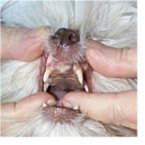A constipated dog
"Canine inflammatory bowel disease?"
A constipated dog is normally easy to identify. They spend longer than usual attempting to defecate, their stool is small, hard, round and pebble like, and there can be anal inflammation and/or bleeding.
A constipated dog is normally easy to identify. They spend longer than usual attempting to defecate, their stool is small, hard, round and pebble like, and there can be anal inflammation and/or bleeding.
These symptoms are readily identified in dogs who are walked for potty breaks, however, for dogs that are sent outside or use a doggy door the symptoms are harder to recognize.
With these dogs the symptoms are normally not identified until they are well advanced, which is an excellent reason to spend at least some time observing your pet outdoors as they "do their business".
The symptoms for a constipated dog that is primarily a "lone pooper" can be excessive whining, difficulty walking and refusal to eat. There are several possible causes for constipation in dogs.
The main cause is when too much water is absorbed by the large intestine, causing stool to be less hydrated and harder to pass. A couple of the reasons for this occurring are insufficient water and too extended a time between bathroom breaks. There are several important ways we can help prevent this. Following is a checklist for constipation prevention:
Constipated Dog Prevention
1) Always ensure your dog is properly hydrated. This means a regular supply of fresh drinking water.
2) Vegetables included in your dogs diet can help prevent a constipated dog. (Always check with your vet to make sure the vegetables are safe to add to your dogs diet!)
3) Plenty of exercise (walking, running, fetch, anything that exerts good strenuous energy) will stimulate your dogs bowels.
4) Certain oils added to your dogs food can assist in the bowel evacuation process. Ask your vet for recommendations. Salmon and olive oil are typically safe for all dogs.
In the event that your dog does become constipated, there are several home remedies you can try before seeing the vet. (It is recommended, however, if your dog is severely bloated or is experiencing rectal bleeding that you see the vet immediately!)
Constipation treatment for dogs
1) A very popular vet-recommended home remedy for constipation is pureed pumpkin. Not pumpkin pie filling which is full of sugar, spices and other fillers. Pumpkin has a high fiber content as well as a high water content.
2) Warm milk, especially when you cannot get your dog to ingest water, will sometimes help with constipation as well as some other digestive issues. This remedy is subject to some debate due to an uncertainty of how well dogs process dairy products.
3) Wet or canned dog food. This works best if your dog has not yet started to refuse food. Some dogs will take this, though, when they have refused all other food.
4) Fiber supplements can be added, typically in powder form, to your dogs canned food. Commercial fiber supplements for humans are typically not fit for a dogs digestive system, but you can add psyllium (a powder herbal supplement). Ask your vet for recommended dosage.
Constipated Dog to Dog Health Info












